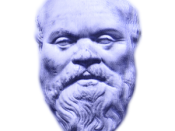Aristotle's Metaphysics must surely rank as one of the greatest books of all time, if one considers the amount of attention that has been devoted to it throughout the ages. Yet who would pretend that this is not one of the most difficult books to understand? The great eleventh century Muslim physician and philosopher, ibn Sina, may have spoken for all of us when he wrote: I read the Metaphysics, but did not understand its contents and was baffled by the author's intention; I read it over forty times, until I had the text by heart. Even then I did not understand it or what the author meant, and I despaired within myself, saying "This is a book which there is no way of understanding." Ibn Sina goes on to tell, in his autobiography, that he did find a key to this puzzle in a treatise of al Farabi, and that he did finally go on to achieve a satisfactory understanding.
But in the twentieth century Sir David Ross, the great English commentator and Aristotelian scholar, still writes of "this desperately difficult work," and most of us will agree with him. The Metaphysics is a supreme challenge to our intellects.
It is a challenge to all sorts of scholars: philologists, historians, philosophers, and others. It is a challenge in its details and it is a challenge as a whole. What do the details mean, and how do they fit into the whole? What does the whole mean? We have dealt with all these viewpoints in the Freelance Academy seminar, but here let me review as simply and briefly as possible the question of the meaning of the text as a whole. The evidence for the remarks that follow will barely be touched on.
It is given elsewhere.
There are...


